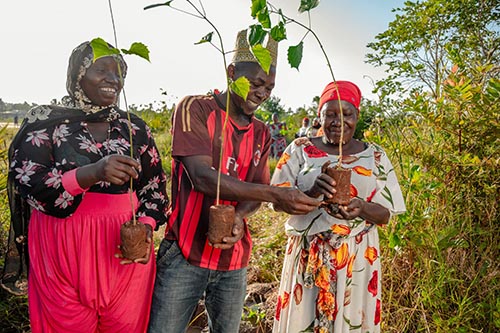According to the Intergovernmental Panel on Climate Change report, there is a vanishing margin of error when it comes to limiting global warming. The report presented to the United Nations in April 2022 says that nations must shift away from fossil fuels far quicker to avoid a catastrophic future.
Unless the nation states immediately increase efforts to reduce emissions of coal, oil, and natural gas, the goal of limiting global warming to 1.5 degrees Celsius (or 2.7 degrees Fahrenheit) will likely be out of reach by the end of this decade. Over this threshold, experts warn, the threats of global warming, such as severe flooding, drought, wildfire, and ecosystem collapse, increase significantly. Since the 19th century, humans have increased the earth’s temperature by an average of 1.1 degrees Celsius by using fossil fuels for energy.
It is, however, a challenging task to correct the wrong. For example, a global reduction in greenhouse gas emissions of 43 per cent by 2030 and a complete cessation of the release of carbon dioxide into the atmosphere by the early 2050s are required to keep global warming to 1.5 degrees Celsius or below, according to the analysis. According to existing strategies by different countries, the reduction in global emissions is only estimated to be several percentage points this decade. After a temporary decline due to the coronavirus epidemic, global emissions of fossil fuels rose to near-record levels last year.
Over 80 per cent of the world population identifies with numerous religious and spiritual communities or cultural traditions which influence how they see and treat the world around them.
Religions are deeply entwined in the fabric of daily lives. The churches, mosques, temples and other religious communities play an essential role in shaping attitudes, opinions, and behaviours for managing and using the environment and natural resources and sustainable development overall.
In its numerous expressions ranging from cultural heritage to cultural and creative industries and cultural tourism, culture enables and drives sustainable development’s economic, social and environmental components. Various cultures’ cohesiveness and well-being suffer common threats that undermine traditional ways of life and livelihoods; and well-intended but misguided development attempts that threaten human rights and sustainable practices. Therefore, it is crucial to understand all parts of people’s cultures — not just the economics or logistics, but the beliefs and spiritual rituals. Diversity must be promoted while protecting human rights and fundamental freedoms for everyone.
Traditional knowledge and customary sustainable usage reinforce indigenous peoples and local communities’ resistance to environmental change, including climate change, and directly contribute to biological and cultural variety and global sustainable development. Sustainable livelihoods, cultural heritage, and indigenous peoples’ knowledge can be jeopardised by initiatives to combat biodiversity loss and climate change.

Suppose respectful relationships are established with indigenous peoples. In that case, the effective management of their resources may considerably contribute to conservation, sustainable use, and fair sharing of biodiversity benefits. We must explore the environment’s relationship with religion, and culture to understand how they may contribute to conserving and preserving the natural environment. The role of diverse value systems and cultural diversity as resources for conservation and climate justice action; and the part of science and other knowledge in bridging the divide between science and other knowledge. We need an integrated approach and its connections to religions, cultures, the environment, and sustainable development’s environmental and social components.
The world community must take decisive action to address severe and growing environmental deterioration and associated social and economic instabilities. Religion and culture can significantly address climate change, biodiversity and ecosystem loss, pollution, deforestation, desertification, unsustainable land and water use, and other pressing issues identified by all nations in a shared vision aligned with the 2030 Agenda for Sustainable Development.
Religious and cultural groups should advocate for robust, inclusive, green, sustainable and transformational economies based on circularity, sharing, cooperation, and alternative growth and welfare metrics. They can play a critical role in teaching people the importance of sustainable lifestyles and behaviours for sustainable consumption and production. Religious and cultural influences have the potential to make a substantial contribution to reducing extreme poverty and associated concerns such as women, youth, and minority rights, as well as universal access to essential services. They can advocate for innovative nature-based solutions, the preservation of traditional knowledge and cultural diversity, environmental stewardship and duty of care, the development of a global and local citizenship ethic, the promotion of good governance, tolerance, and reconciliation, and the establishment of safe, inclusive, and peaceful societies. Promoting and communicating morals, values, behaviours, and innovative solutions have never been more critical. With a growing knowledge of religious consensus on environmental ethics, this global objective may serve as the foundation for a shared vision that emphasises religion and culture’s role in attaining sustainability. Interfaith and intercultural discourse agree on a few fundamental principles, like the sacredness of nature and the rights of nature shared by the majority of organised faiths, indigenous peoples, and many natural scientists, among the numerous positive actions — large and small — SDG 2030 and the Paris Climate Change Agreement; the actions of faith-based declarations and statements, particularly concerning climate change and cultural diversity. These forces must coalesce to establish worldwide cooperation to transform the paradigm and tackle the critical issues of our day, both for humanity today and for future generations.
“And We made the sky a protected ceiling, but they, from its signs, are turning away.” Quran, 21:32
The Qur’an tells us that Allah cares for us by endowing our earth with an ozone layer that protects us and other species from harmful UV radiation. However, Allah is well aware that mankind’s avarice would destroy the ozone layer. This serves as a reminder that we must safeguard Allah’s creation to protect ourselves.



